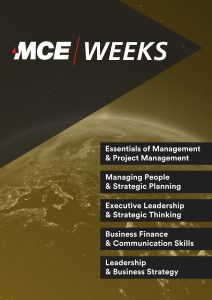Get the key skills to motivate teams, grow your emotional intelligence, delegate & manage conflict professionally and become a great strategic planner and make the right decisions for your company.
Module 1 (3 Days)
Successfully Managing People
Key Competencies
- Motivation, delegation and giving feedback
- Managing conflicts
- People management skills
- Emotional intelligence
- Ethical leadership
Learn, Practice and Use
- Motivate every member of your team—even if they are very different
- Adjust your management and personal style to the needs of different situations
- Resolve conflict more effectively in a wide variety of situations
- Get more done by using the best delegation techniques for each situation
- Turn difficult people and poor performers into team players
- Win the cooperation and trust from people in your organization
- Increase your confidence, management skills, and personal and professional satisfaction in your job by managing people successfully
- Use positive and corrective feedback to turn problem employees around and maximize productivity
Full Module details
The Experience of Being a Manager
- How to get people to want to do what they’re supposed to do
- Specific challenges you face when motivating others
Values
- Values and their impact on work life
- How values can have productive and nonproductive results
- Identify value conflicts in yourself and in others
Personal Styles
- Determine your own personal style profile
- Gain insight into the strengths and limitations of your profile
- Use behavioural clues to determine others’ personal styles
- How to work more effectively with other personal profiles
Motivation
- Employee motivation factors and their impact on behaviours and work settings
- How to tailor your motivational efforts to individual employees and different situations
Listening, Body Language, Giving Feedback, and Dealing with Difficult People
- Use active listening to gain information and understand employees’ perspectives
- Effectively apply positive and corrective feedback
- Use appropriate values alignment when dealing with difficult employees
Conflict Management
- The dimensions of conflict resolution
- Identify your own preferred conflict-resolution styles for better conflict management
- Use different conflict resolution styles in different situations
Delegation
- Different delegation styles: How and when to use them
- Determine the appropriate delegation style for employees and situations
Understanding Organizational Culture and Subculture
- The impact of organizational culture and subculture and “cultural blinders”
- Explore the assumptions that impact your team’s thinking and actions
- Identify and build on the strengths of your team’s culture
Emotional Intelligence
- The components of emotional intelligence
- Gain an honest and accurate assessment of yourself
- Develop an improvement strategy
Ethical Leadership
- Identify your group’s values
- Your vision for ethical leadership
Action Planning
- Develop a specific plan for applying what you’ve learned back on the job
- Identify people who can support your action plans
Module 2 (2 Days)
Essentials of Strategic Planning
Key Competencies
- Strategic planning skills
- Making strategic decisions
- Managing stakeholders
- Market segmentation skills
- Linking actions to strategy
- 7 strategic planning models
Learn, Practice and Use
- Understand what strategy and strategic planning mean to an organization
- Learn key concepts and the language used by those involved in strategic planning
- Discover various approaches companies use to develop strategy
- Find out how strategy moves from concept through implementation to realization
- Recognize techniques companies use to assess their current and future environments
- Identify specific ways you can contribute to your organization’s strategic success
- Link your specific role to the organizational strategy
- Determine key stakeholders in your company
- Learn and practice the 5 stages of a classic strategic planning framework
- Review the key stages of the strategic planning process
- Share your knowledge and challenges with your peers and MCE’s highly experienced faculty
Full Module details
Define Strategic Planning and Strategy
- Identify Five Key Questions for Organizational Success
- Recognize a Generic Process for Strategy Formation
- Determine Key Stakeholders
- Describe How Strategy Permeates the Organization
Why Organizations Create Strategy
- Recognize the Grand Design Within the Organization
- Explain the Significance of the Environments Affecting the Organization
- Discuss Growth and Profit Strategies
- Describe Various Market Segmentations
- Identify How Organizations Create Value for Their Customers and Stakeholders
- Express How an Organization Decides It Value Proposition
- State Why It Is Important to Link Your Actions to Strategy
The Strategic Planning Process in Action
- Identify the Five Stages of a Classic Strategic Planning Framework
- Describe How Strategy Works in an Organization
- Articulate the Highlights and Time Requirements of the Process
- Recognize Your Role in Your Organization’s Strategic Plans
Assessing the Environment
- Identify Strategic Patterns in the Environment
- Explain and Anticipate Patterns
- Express Why Assessing the Environment Is Important
- Describe Six Tools/Techniques for Conducting External and Internal Assessments
Three Ds of Strategy—Discussions, Decisions and Development
- Review Key Stages of the Strategic Planning Process
- Describe How SWOTs, Core Competencies and Critical Success Factors Are Incorporated into the Strategic Discussions
- Appreciate the Rationale Behind Strategic Decisions
Implementing and Reviewing Strategy
- Discuss Strategic Alignment and What It Means to an Organization
- Identify the Ways an Organization Creates Strategic Alignment
- Develop a Series of Questions to Facilitate Strategic Conversations
- Recognize Accountability Systems
- Identify Reward and Recognition Incentives for Success
- Express Why, When and How Often Strategy Should Be Reviewed
Alternative Approaches to Create Strategy
- Identify Seven Strategic Planning Approaches
- Discuss Which Approach Would Best Fit Your Organization
Dates & Locations
12 Jun – 16 Jun (Paris)
17 Jul – 21 Jul (Barcelona)
7 Aug – 11 Aug (London)
2 Oct – 6 Oct (Dubai)
4 Dec – 8 Dec (London)
Duration
5 Day(s)
Price
€4595


